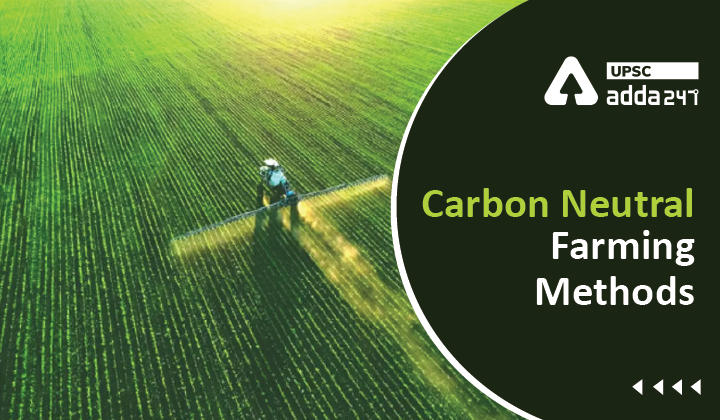Table of Contents
Carbon Neutral Farming Methods: Relevance
- GS 3: Technology missions
Carbon Neutral Farming Methods: Context
- Kerala is set to become the first state in India to introduce carbon-neutral farming methods to mitigate the effects of climate change on agriculture.
Carbon Neutral Farming Methods Kerala: Key points
- The state will introduce carbon-neutral farming methods in selected locations, for which the government has allocated ₹6 crore in the 2022-23 Budget.
- In the first phase, carbon-neutral farming will be implemented in 13 farms, and steps are on to convert the State Seed Farm at Aluva a carbon-neutral farm.
- In the second phase, model carbon-neutral farms will be developed in all the 140 Assembly constituencies.
Carbon Neutral Farming Methods: Why important
- Carbon-neutral agriculture is becoming the need of the hour for environmental balance and improved health and safe sustenance of future generations.
- Kerala is witnessing the impact of global warming and climate change, as was evidenced by the unpredictable heavy rain and flooding in recent times.
- In such a situation, it is imperative for the state to adopt new and innovative agricultural practices.
- Carbon neutral agriculture would reduce carbon emissions and help carbon to be stored in the soil.
Carbon neutral agriculture Kerala
- The state government has decided to form an organic agriculture mission in 2022 to ensure the production of safe food within the state.
- As part of the mission, farmers will be trained in agriculture practices that reduce emission of greenhouse gases like carbon dioxide.
- Further, ecological engineering, composting, increasing the level of organic carbon in the soil and carbon sequestration in soil will be given more thrust.
- Workshops on carbon neutral agriculture will be organised in every panchayat.
What is carbon neutral agriculture?
- Carbon farming is a system of agricultural management that helps the land store more carbon and reduce the amount of greenhouse gases that it releases into the atmosphere.
- For example, Indian farmers can manage their grazing lands to conserve and restore vegetation, including tree cover along waterways.
- Similarly, farmers can also implement fertilizer reduction strategies, such as applying compost or biochar, to reduce the amount of greenhouse gases tied up in vegetation.
Need of carbon farming
- Agriculture and climate change are closely related.
- Agriculture is regarded as one of the main sources of carbon dioxide (CO2) and methane (CH4), two of the potent greenhouse gases, however, it also holds a great potential to sequester and store carbon in plants, trees and soils.
- A more carbon neutral agriculture is possible, if proper farm management practices are adopted to optimise the carbon balance in farming systems.
- These can include practices aiming at reducing livestock CH4 emission, practices that result in a reduced use of farm inputs (e.g. fuels, pesticides, fertilisers) or practices that help keep carbon stored in soils.



 TSPSC Group 1 Question Paper 2024, Downl...
TSPSC Group 1 Question Paper 2024, Downl...
 TSPSC Group 1 Answer key 2024 Out, Downl...
TSPSC Group 1 Answer key 2024 Out, Downl...
 UPSC Prelims 2024 Question Paper, Downlo...
UPSC Prelims 2024 Question Paper, Downlo...




